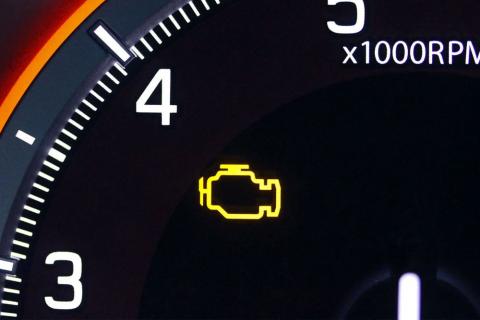
The dreaded glow of the check engine light on your dashboard can be a source of anxiety for many drivers. While it may seem like an ominous warning, understanding the potential causes and solutions can help ease your concerns and ensure that your vehicle stays in peak condition. In this blog post, we'll delve into the common reasons behind the check engine light illumination and explore the steps you can take to address them.
Loose or Faulty Gas Cap: Believe it or not, a loose or faulty gas cap is one of the most common reasons for the check engine light to come on. A loose cap can allow fuel vapors to escape, triggering the sensor. Ensure your gas cap is tightened properly, and if the issue persists, consider replacing it with a new one.
Faulty Oxygen Sensor: The oxygen sensor monitors the level of oxygen in your exhaust gases, helping regulate fuel injection and emissions. A malfunctioning sensor can lead to reduced fuel efficiency and increased emissions. If your check engine light is on, have the oxygen sensor inspected and replaced if necessary.
Issues with the Mass Airflow Sensor: The mass airflow sensor measures the amount of air entering the engine, which is crucial for optimal fuel injection. A malfunctioning sensor can result in poor fuel economy and engine performance. A professional inspection can identify any issues with the mass airflow sensor and allow for timely repairs.
Faulty Ignition Coils or Spark Plugs: Ignition system components like coils and spark plugs play a vital role in combustion. If these components are faulty, it can lead to misfires, reduced engine performance, and an illuminated check engine light. Regular maintenance and prompt replacement of worn-out parts can prevent such issues.
Catalytic Converter Problems: The catalytic converter helps reduce harmful emissions by converting pollutants into less harmful substances. If it fails, your vehicle may not pass emissions tests, and the check engine light will come on. Diagnosing catalytic converter issues may require professional assistance.
Malfunctioning Thermostat: A malfunctioning thermostat can affect your engine's temperature regulation, potentially leading to overheating. This issue may trigger the check engine light, and it's crucial to address thermostat problems promptly to avoid engine damage.
Electronic Control Module (ECM) Issues: The ECM, also known as the car's computer, manages various engine functions. If there are issues with the ECM, it can lead to a check engine light activation. Diagnosing and repairing ECM problems often require specialized equipment and professional expertise.
While the check engine light may cause concern, it serves as an important indicator of potential issues within your vehicle. Ignoring it can lead to more significant problems and costly repairs down the road. By addressing the underlying causes promptly and seeking professional assistance when needed, you can ensure that your car remains in optimal condition and minimize the impact on your driving experience. Regular maintenance and proactive troubleshooting are key to keeping your vehicle's check engine light at bay. Give us a call today to schedule an appointment!
 Mon-Fri: 7am-5pm
Mon-Fri: 7am-5pm (479) 717-2888
(479) 717-2888 126 S Goad Springs St, Lowell, AR 72745
126 S Goad Springs St, Lowell, AR 72745
 Sign-up today for service interval reminders such as: oil & filter, brakes, tires, and more... These parts are designed to wear & need to be replaced before any major damage occurs. We can help.
Sign-up today for service interval reminders such as: oil & filter, brakes, tires, and more... These parts are designed to wear & need to be replaced before any major damage occurs. We can help.